JavaScript is disabled for your browser. Some features of this site may not work without it.
Buscar en RiuNet
Listar
Mi cuenta
Estadísticas
Ayuda RiuNet
Admin. UPV
Brewer's spent grains as biofuels in combustion-based energy recovery processes: Evaluation of thermo-oxidative decomposition
Mostrar el registro sencillo del ítem
Ficheros en el ítem
| dc.contributor.author | Gil-Castell, O.
|
es_ES |
| dc.contributor.author | Mascia, N.
|
es_ES |
| dc.contributor.author | Primaz, C.
|
es_ES |
| dc.contributor.author | Vásqez-Garay, F.
|
es_ES |
| dc.contributor.author | Baschetti, M. G.
|
es_ES |
| dc.contributor.author | Ribes-Greus, A.
|
es_ES |
| dc.date.accessioned | 2023-05-04T18:02:00Z | |
| dc.date.available | 2023-05-04T18:02:00Z | |
| dc.date.issued | 2022-03-15 | es_ES |
| dc.identifier.issn | 0016-2361 | es_ES |
| dc.identifier.uri | http://hdl.handle.net/10251/193136 | |
| dc.description.abstract | [EN] The high global generation of wastes and side streams from agri-food production has led to environmental impact and causes nature degradation due to their uncontrolled management. These wastes are profitable materials with significant economic value that could otherwise be exploited as new sources in the feed industry or the production of bioenergy. Among them, brewer¿s spent grain (BSG) is a solid by-product generated in the beerbrewing process that consists of the barley grain husks together with parts of the pericarp and seed coat layer. Although it is rich in fibres and proteins, its main use is currently limited to animal feed or simply deposition to landfills. This study pursues the evaluation of BSGs as biofuels in energy recovery processes. For this purpose, the elemental composition, the higher heating value, the content of volatiles, fixed carbon, moisture, and ash yield along with the kinetic analysis of its decomposition during thermo-oxidative combustion were assessed. The thermo-oxidative decomposition of hemicellulose, cellulose, lignin, and char occurred in two main stages. The average apparent activation energy for Stage I was 190¿200 kJ¿mol¿ 1, significantly higher than that of Stage II (100¿150 kJ¿mol¿ 1). Stage I revealed a random nucleation kinetic model (Fn) and involved the volatilisation of hemicellulose and cellulose and partially lignin. Stage II, described by a three-dimensional diffusion kinetic model (D4), comprised the completion of lignin and the decomposition of char. The environmental advantage of using such residues was demonstrated with the low ash yield (in the range of 1.7¿5.4%) and high calorific value between 17.8 and 19.1 MJ¿kg¿ 1. The obtained results serve as the baseline for describing the energy recovery process in a reactor that uses BSG residues as feedstock under oxidative conditions. Altogether it is pointed out the feasibility of using pelletised BSGs regardless of the malt type or mixture as a renewable source of energy in incineration plants above 500 ¿C. | es_ES |
| dc.description.sponsorship | The authors would like to thank the support of Generalitat Valenciana for the APOSTD/2020/155 grant for O. Gil-Castell. The Chilean Economic Development Agency (CORFO) is acknowledged for the financial support through project 13CEI2-21839 for the contract for C.T. Primaz. The European Commission is thanked for the project LIFE-LIBERNITRATE (LIFE16 ENV/ES/000419). | es_ES |
| dc.language | Inglés | es_ES |
| dc.publisher | Elsevier | es_ES |
| dc.relation.ispartof | Fuel | es_ES |
| dc.rights | Reconocimiento - No comercial - Sin obra derivada (by-nc-nd) | es_ES |
| dc.subject | Biomass | es_ES |
| dc.subject | Valorisation | es_ES |
| dc.subject | Renewable energy | es_ES |
| dc.subject | Kinetic analysis | es_ES |
| dc.subject | Activation energy | es_ES |
| dc.subject.classification | MAQUINAS Y MOTORES TERMICOS | es_ES |
| dc.title | Brewer's spent grains as biofuels in combustion-based energy recovery processes: Evaluation of thermo-oxidative decomposition | es_ES |
| dc.type | Artículo | es_ES |
| dc.identifier.doi | 10.1016/j.fuel.2021.122955 | es_ES |
| dc.relation.projectID | info:eu-repo/grantAgreement/COMISION DE LAS COMUNIDADES EUROPEA//LIFE16 ENV%2FES%2F000419//Responsible reduction of nitrates in the comprehensive water cycle/ | es_ES |
| dc.relation.projectID | info:eu-repo/grantAgreement/GENERALITAT VALENCIANA//APOSTD%2F2020%2F155//CONTRATO POSDOCTORAL GVA-GIL CASTELL. PROYECTO: POLIELECTROLITOS FUNCIONALIZADOS PARA PILAS DE COMBUSTIBLE DE METANOL EN SISTEMAS/ | es_ES |
| dc.relation.projectID | info:eu-repo/grantAgreement/CORPORACION DE FOMENTO DE LA PRODUCCION, CORFO//LEITAT. 13CEI2-21839//CENTRO DE EXCELENCIA EN NANOFIBRAS LEITAT CHILE (CEN LEITAT-CHILE)/ | es_ES |
| dc.rights.accessRights | Abierto | es_ES |
| dc.contributor.affiliation | Universitat Politècnica de València. Escuela Técnica Superior de Ingenieros Industriales - Escola Tècnica Superior d'Enginyers Industrials | es_ES |
| dc.description.bibliographicCitation | Gil-Castell, O.; Mascia, N.; Primaz, C.; Vásqez-Garay, F.; Baschetti, MG.; Ribes-Greus, A. (2022). Brewer's spent grains as biofuels in combustion-based energy recovery processes: Evaluation of thermo-oxidative decomposition. Fuel. 312:1-14. https://doi.org/10.1016/j.fuel.2021.122955 | es_ES |
| dc.description.accrualMethod | S | es_ES |
| dc.relation.publisherversion | https://doi.org/10.1016/j.fuel.2021.122955 | es_ES |
| dc.description.upvformatpinicio | 1 | es_ES |
| dc.description.upvformatpfin | 14 | es_ES |
| dc.type.version | info:eu-repo/semantics/publishedVersion | es_ES |
| dc.description.volume | 312 | es_ES |
| dc.relation.pasarela | S\455651 | es_ES |
| dc.contributor.funder | GENERALITAT VALENCIANA | es_ES |
| dc.contributor.funder | COMISION DE LAS COMUNIDADES EUROPEA | es_ES |
| dc.contributor.funder | CORPORACION DE FOMENTO DE LA PRODUCCION, CORFO | es_ES |
| dc.subject.ods | 07.- Asegurar el acceso a energías asequibles, fiables, sostenibles y modernas para todos | es_ES |
| dc.subject.ods | 09.- Desarrollar infraestructuras resilientes, promover la industrialización inclusiva y sostenible, y fomentar la innovación | es_ES |
| dc.subject.ods | 13.- Tomar medidas urgentes para combatir el cambio climático y sus efectos | es_ES |
| dc.subject.ods | 15.- Proteger, restaurar y promover la utilización sostenible de los ecosistemas terrestres, gestionar de manera sostenible los bosques, combatir la desertificación y detener y revertir la degradación de la tierra, y frenar la pérdida de diversidad biológica | es_ES |







![[Cerrado]](/themes/UPV/images/candado.png)

